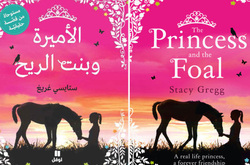 Once upon a time, in the not-so-distant past, there lived a beautiful queen, adored by her King and children and much loved by the people of the land. The King and Queen, famous for their compassion and love for their people, were bound by a deep sense of duty to support the betterment of each and every individual in the land. They would often travel about the Kingdom to wherever they felt their presence most needed earning the altruistic Queen the title of 'Mother of the poor'. Until sadly, on one ill-fated day, the helicopter transporting the Queen crashes and the Kingdom is plunged into mourning. The King, not only a monarch who has to address his people on the loss of their beloved Queen but as a father he is saddled with the daunting task of informing his two young children, a boy and a girl, that their mother will never return to them again; they will now have to face the ultimate challenge of resuming life without her. Although the above tale seems as if it were the stuff of fiction, it is a rather brief, but true, account of the life of HRH Queen Alia al-Hussein, the late Queen Consort of Jordan and the third wife to the late King Hussein Bin Talal of Jordan. The children she leaves behind are Prince Ali Bin al-Hussein and Princess Haya Bint al-Hussein, the 'real-life princess' who is the inspiration for Stacy Gregg's children's novel 'The Princess and the Foal'. The novel highlights a series of events in the life of Princess Haya that occur between the ages of five and twelve. As a young 'titch' she is heartbroken and inconsolable in spite of her father's continuous efforts to help her get over the tragic death of her mother. Adding to her sense of loss is the departure of her old nanny, Grace, who has been replaced by the two-faced governess Frances Ramsmead. With one 'personality' reserved for the King and another for the children and staff, matters don't go smoothly simply because 'Frances is a stupid meany' a young Prince Ali confirms. Haya's source of solace is her love of horses and it is only at the Royal Stables in Al Hummar that she feels strongest and happiest. Unfortunately, Frances continuously tries to discourage her from being with her beloved animals believing it is the Princess's duty to be a lady, not to associate with the stable staff. So, when she is entrusted with the care of a young foal on her sixth birthday, who she names 'Bint al Reeh' aka 'Bree', her life takes a different turn and the sadness slowly starts to dissipate. Drawing on the memory of her mother as an athlete, she dreams that she will one day be the first female horse rider to win the King's Cup and make her Father proud. Her dream isn't without obstacles leaving her, in the darkest hour, with a sense that its realisation may be hopeless and unattainable. Many lessons are learnt along the way. Stacy Gregg tells a beautiful, refreshing, engaging tale about a princess with a dream. A princess who is not only proud of her ancestry (she wants to be a proper Arabian Princess) but is also endowed with her parents' sense of duty and responsibility. Haya is also a sister and the mischief she gets up to with her brother, Prince Ali, are the best parts of the book and will make you laugh out loud. They are like two peas in a pod and Gregg captures a genuinely affectionate sibling relationship that is heartfelt and heartwarming.
1 Comment
 Reviewed by Rana Asfour Publishing date is June 19 by Random House UK, Cornerstone "Ask, and it shall be given you; seek, and ye shall find; knock, and it shall be opened unto you" (Mathew 7:7). But what if the answers are none one seeks to hear or harbinger an existence too unbearable to grasp, answers seeming instead cruel and pointless? Does one break away from one's belief or does it become one's salvation helping one to understand, learn and grow stronger and closer to The One? How much can one person be expected to endure as 'God tests His faithful servants'? What happens when we die? What compels humans to willingly place not only faith, but hope and trust in divine doctrines that seem powerless to stop death and adversity? These difficult questions are at the core of Carys Bray's debut novel 'A Song for Issy Bradley'. Mormons, Claire and her husband, Bishop Ian Bradley, have lost their five-year-old girl Issy. Suddenly and without any warning, their life is turned upside down and everything they have ever believed in and raised their three remaining children Alma, Zipporah (Zippy), and Jacob to believe is tested and challenged every step of the way as they try to deal with life at this difficult time. The novel details Mormon life and beliefs through the Bradley's interactions with each other, the members of their faith and 'non-members' in the wider community particularly with regards to Issy's death. Mormons believe that the body is but a vessel that carries the soul inside it and when one dies, the soul leaves this 'shell' and waits for its loved ones in Eternity. As comforting as the idea of reuniting with loved ones may be, how much solace is it to a mother who will never touch or see her child again and to whom Eternity seems like an unbearably long time to wait? or to one brother who wishes he'd told his sister how much he loved her and appreciated her and another who feels they should have grown up and done things together being so close in age; that same brother who is yet too young to understand that the words of God concerning resurrection are not to be taken literally. And how do you comfort a sister who knows she'll one day walk down the aisle but her sibling 'will never be a bridesmaid'? Issy's father, Bishop Ian Bradley has problems of his own to deal with. A strict and devout Mormon, he is torn between his devotion to his faith and his duty to his parishioners that consumes him leaving not much time for his family and his role as a father who is grieving for the loss of his beautiful baby girl. He is obstinate, unemotional and quite selfish, yet the reader knows he only carries good intentions and his unwavering belief in the righteousness of what he is doing is quite infuriating if not also admirable. And yet when he finally realises that his family is crumbling before his eyes, that is when we see the true nature of the man come to the forefront and whether or not he is the better for it I will leave to the reader's discernment. The novel also sheds light on certain aspects that concern growing up in a Mormon community. Carys Bray herself was raised by strict Mormon parents and her first-hand experience as such is quite relevant particularly when it comes to describing Zippy's feelings for Adam, a boy in her school that she likes. As a Mormon Zippy is conflicted between giving in to her budding sexuality and the commandment that is the law of chastity which dictates abstinence from sex before marriage. That God expects His followers to keep thoughts clean and be modest in dress, speech, and actions. This not only sets Zippy apart from her counterparts at school obliging her to correct certain misconceptions regarding her faith but it also creates guilt and the need to 'confess' after a brief incident between Adam and herself. Although the novel in places feels like a 101 class in the Mormon faith, it's saving grace is Bray's beautiful style of writing. She manages to make her characters real, and loveable. Carys Bray tells a stunning heart-warming story about loss that is brave, even funny and so heartbreaking in its sincerity that you'll need to keep that tissue box handy. In short, this is a book about a family, any family, who has to conjecture enough faith to miraculously resurrect itself from the abyss after having lost one of its own. |
Archives
March 2021
|




 RSS Feed
RSS Feed
